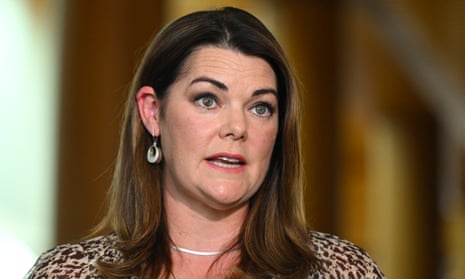The Greens senator Sarah Hanson-Young has watered down her demand for a royal commission examining the role of the Murdoch media in Australia, now describing it as a “trusted” news provider compared with unregulated social media platforms.
Hanson-Young says she still wants a royal commission but that she is no longer advocating for it to focus specifically on media outlets owned by News Corp.
“Upon reflection, I think the community, while they’re upset and they distrust the Murdoch media, they’re increasingly looking at other players and going ‘you know, this needs a clean up across the board’,” Hanson-Young said in an interview for Guardian Australia’s Australian Politics podcast.
She also listed the Murdoch media among “trusted news providers” which could have their journalism actively blocked from social media platforms if their owners make good on threats to deprioritise news.
Hanson-Young has drafted a private senator’s bill calling for a special commission. Drafted last year and currently being examined by a Senate committee, the Murdoch media inquiry bill 2023 aims to create a commission of inquiry “into the current state of media diversity and conduct of media outlets operating in Australia, in particular the Murdoch media empire, and their impact on Australian democracy”.
Now, she said it should scrutinise all media equally.
“So, you know, maybe it’s a reframing,” she said. “But nonetheless, some type of independent commission to inquire to test and push the boundaries, to try to have that overarching regulation.”
Hanson-Young also called for the government to use its existing powers to designate major tech companies that are no longer willing to pay traditional media organisations for the journalism they feature on their platforms.
Under the news media bargaining code, a formal designation would force the companies to pay for the news they feature. Currently, companies including Google and Meta are paying media companies under voluntary agreements. But Meta, which owns platforms including Facebook and Instagram, has indicated it will not continue the arrangement, arguing its users are no longer interested in news.
Hanson-Young said the government’s code designation should go beyond payment.
“Along with designating these social media platforms to have to pay for the content, the news content, I actually think they need to be designated to carry news in the public interest,” she said.
The senator described a scenario in which a conspiracy theory could be spreading via a social media platform but its owner blocks users from sharing factual, countervailing information from “trusted news providers like the Guardian, like the ABC, like the Murdoch press – like the local newspaper in a small rural town”.
Questioned about her change of tune on News Corp, she said there were “some decent journalists” at the company “who do good work”.
after newsletter promotion
“It’s the business model of outrage that I see coming from Murdoch management that worries me the most and their undue influence.”
The assistant treasurer, Stephen Jones, told Guardian Australia this week that social media companies had a “social responsibility”, including to carrying news on their platforms.
“There needs to be a place where people can go and get fact-tested, reliable information. In Australia, journalism is one of the critical sources of that information,” Jones said.
“If people are going to Facebook or other social media platforms for that information, then they should be able to get it there.”
During negotiations on the first round of the code in 2021, Facebook blocked all news on its platform in Australia, and inadvertently blocked information and government pages, including health and emergency services. The ban was later reversed, but with Canadian news outlets also facing long-lasting bans on Facebook, there is concern that Meta may enact similar responses in Australia.
Jones urged Meta not to repeat that response here.
“They [Meta] have threatened in Australia and around the rest of the world that they’re going to remove news content from the screens. We think that’s both a concern and anti-democratic,” he said.
“It’s absolutely fundamental to a well-functioning democracy that people have access to fact-tested news and reliable information sources. We intend to back local journalism, we think it’s a critical pillar in our democracy.”
